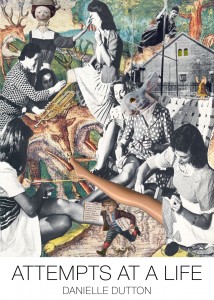 In The Review of Contemporary Fiction, Kate Zambreno reviews Danielle Dutton’s Attempts at a Life.
In The Review of Contemporary Fiction, Kate Zambreno reviews Danielle Dutton’s Attempts at a Life.
In one of the prose pieces in Danielle Dutton’s first collection, the author uses a text from Céline reproduced on a collage given to her by a friend, a fittingly personal history for her relationship to these words given her project at hand. Collage is the operating formal device utilized throughout the slim volume, where the author repurposes and recontextualizes lines from writers such as Ann Quin, Robert Walser, Katherine Mansfield, Sappho, even from Jerome Rothenberg’s anthology Revolution of the Word. With this project, and her attempt to breathe new life into these originary works, Dutton seems to be carrying through Borges’ saying that he was more proud of what he has read than what he has written. Jackson MacLow made famous the technique of borrowing from and reappropriating literary texts with his poems that used what he called a “diastic” or “spelling-thru” method with Virginia Woolf’s The Waves. Except for a brief list at the end, the reader of Attempts at a Life is not told how exactly Dutton performs surgery on the source texts. The stories often read like curious abstract puzzles, and one should resist running to the bookshelves to attempt to break the code. The best pieces call to mind that of Gertrude Stein or Diane Williams, both obvious influences on Dutton whose lines she also pastiches, with a voice that comes off as refreshingly eccentric, as in the title story, a collection of nine fragmented first-person biographies. She also reimagines the lives of famous heroines from literature, from Hester Prynne to Virginia Woolf’s Mary Carmichael in A Room of One’s Own to Alice James to Madame Bovary. Her glorious version of Jane Eyre reads like one of The Guardian’s congested reads as reimagined by Gertrude Stein or Jane Bowles.
See also: Attempts at a Life and all posts tagged Danielle Dutton.